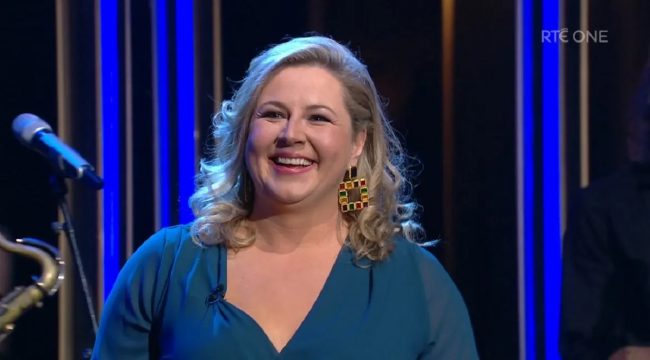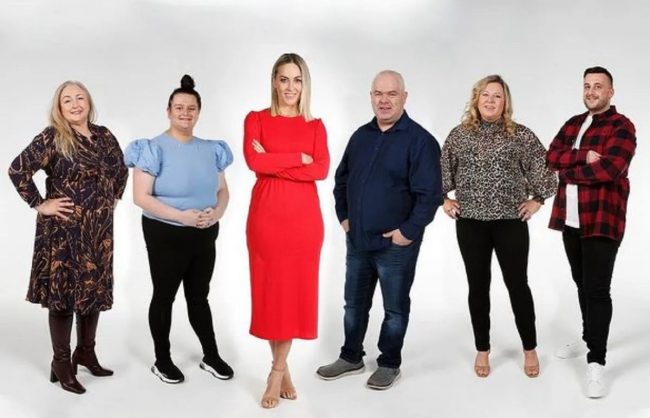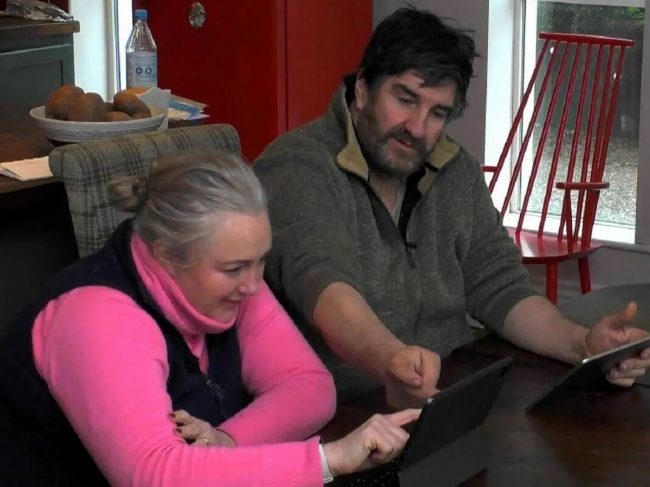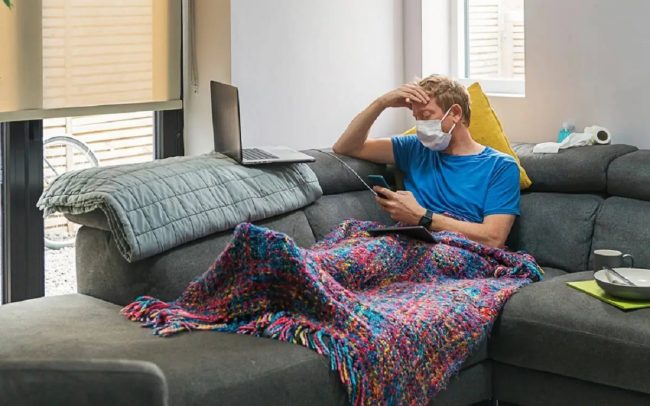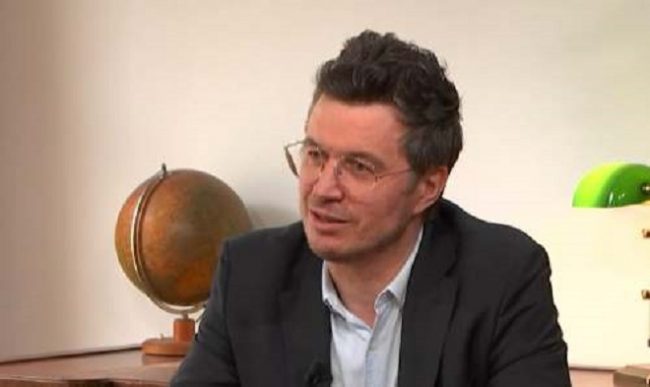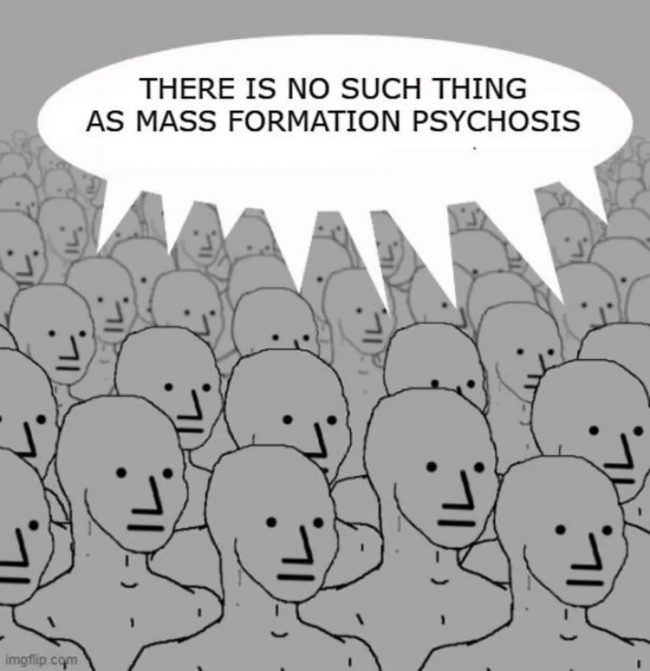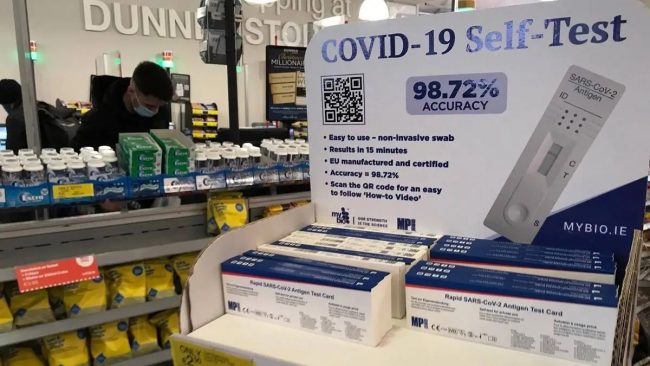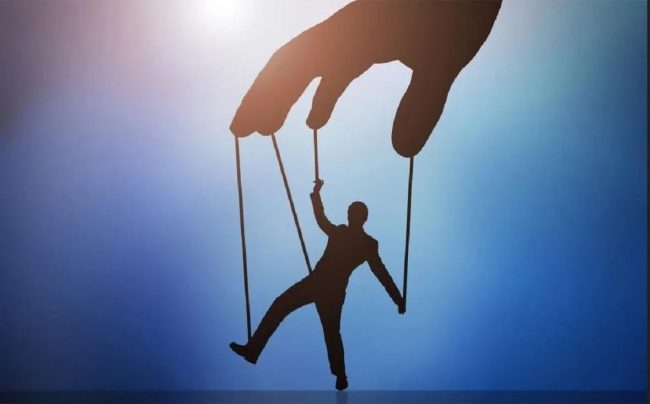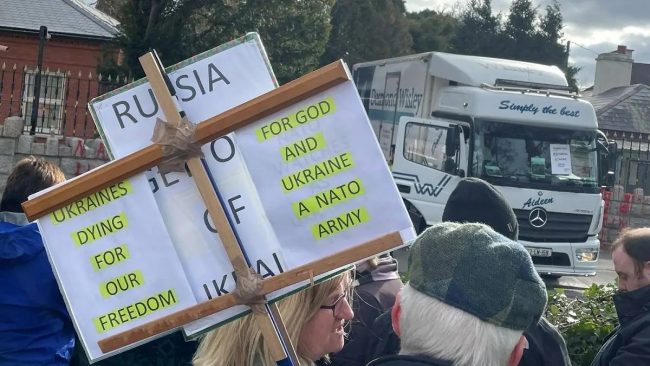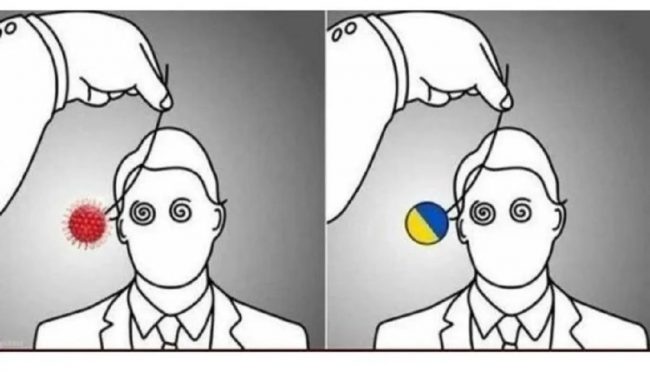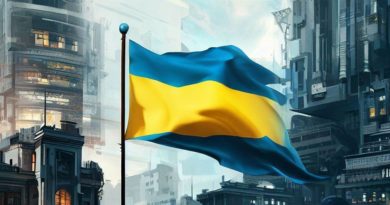Operation Mass Formation
Claire O’Driscoll
Despite an apparent shift in the mainstream narrative to the crisis in Ukraine, the Irish State’s Covid-19 propaganda war rages on. Popular TV shows, like RTE’s diet & fitness series Operation Transformation, are to be found on the frontline of this battle for hearts and minds.
“We need to sing again. We need to be Irish. We need to socialise. We need to be ourselves.”
So said Sarah, professional singer and mother from Ballina, County Tipperary, on the Late Late Show, only a few hours after Taoiseach (Prime Minister) Micheal Martin’s address to the nation and his surprise announcement that most of the Irish State’s Covid-19 restrictions were to be lifted almost immediately.
The Late Late Show, for those of you who may not know, is one of the world’s longest-running talk shows, and has been gracing Irish television screens, courtesy of state broadcaster RTE, every Friday evening since the 1960s.
Sarah’s comments, coming just after she’d performed a rousing showband style rendition of Ike and Tina Turner’s ‘River Deep – Mountain High’, seemed to capture the official (i.e. state-sanctioned) mood of the nation and prompted host Ryan Tubriday to gush “That is good stuff! Congratulations Sarah!”
So why was Sarah from Tipperary opening the Late Late Show on this particularly momentous occasion? Sarah, as it turns out, is one of the ‘leaders’ of this year’s iteration of RTE’s diet and fitness show Operation Transformation (or OT as it is known to cult members).
A staple of Irish TV since 2008, OT has become, much like the Late Late Show itself, something of a national institution in this country.
Each year, the programme features five contestants. These are ordinary Irish people who want to lose weight, kick unhealthy habits and get fit. The show refers to these participants as ‘leaders’; the idea being that, through inspirational example, the contestants will ‘lead’ the diet-and-exercise-hesitant Irish public into the promised land of health and fitness.
The leaders are assisted in their endeavours by a panel of four ‘experts’: a dietician, a personal trainer, a clinical psychologist and a GP, who, between them, design individually tailored diet and fitness plans for each leader. The leaders’ homes and fridges are then kitted out with webcams so that we, the audience, can have an intimate view of their struggles.
Even better, every Wednesday evening we get to see how much progress our leaders have made, or, if they haven’t made any, to enjoy the veritable bollocking they will receive from the panel of experts. We can also download the OT app ourselves and follow the diet and fitness plans of whichever leader we choose to follow. There are national OT fitness event extravaganzas and ‘partnerships’ with most Irish supermarkets.
As I said, an institution. Supported by another institution: the Irish State. The Department of Health has spent 230,000 euro sponsoring Operation Transformation, and its logo is prominently displayed throughout the show.
Sarah is also the first leader whose progress we get to see the following Wednesday. As OT host Kathryn Thomas remarks of Sarah’s performance on The Late Late Show, “You just captured that moment that everybody was feeling! It was a moment of celebration!”
But while four of our leaders are feeling celebratory and enjoying their state-sanctioned return to freedom, things aren’t looking quite as rosy for the fifth, salon-owner Kathleen, who, along with her farmer husband Tony, lives on a farm in Carrignavar, County Cork. Terrifyingly, Kathleen and Tony had both tested positive for covid the previous week.
As Kathleen explains, “One of my main symptoms of covid is that I’ve been completely bored”, while Tony is more philosophical about their predicament, remarking that “Well, I’ve kind of been isolating for the past 40 years anyway.”
Kathleen and Tony are regulars at their local cattle mart but, because of covid restrictions and lockdowns, they have had to make do with virtual visits on their tablets. This is not an entirely satisfactory alternative, however.
As Kathleen notes to Tony of one animal they are considering buying, “She’s a much poorer looking cow on your screen than on mine.” The couple also lament that, in the age of virtual cattle-trading, “The human interaction isn’t there.”
OT host Kathryn Thomas uses this as a cue to joke, “But at least one thing wasn’t in short supply in the house….” She’s referring to antigen tests.
We are then treated to a montage of Kathleen and Tony shoving nylon-tipped plastic swabs up their nostrils while making squirming faces, all to an R&B soundtrack.
This seems to be particularly traumatic for poor Tony, who needs to sit down and have his wife perform the procedure for him each time. And who can blame him? After all, this is no man flu. This is Covid-19.
Later, Kathleen has a video call with OT fitness expert Karl Henry, who wants to find out how she’s doing.
“I feel great. I feel fine,” she says, “the only thing is the boredom of it all and the isolation of it all. The feeling is (as) if I nearly have leprosy for some reason!” Karl has a good chuckle at Kathleen’s analogy (even though she doesn’t seem to be joking) and assures her she is not the only one feeling this way, stating that, “What you’re going through, people around the county are going through. It’s a really normal thing!”
Nevertheless, Karl and the other OT experts are taking no chances. When it’s Kathleen’s turn to have her weekly check-in, she has to do it remotely, despite having come out of her required isolation period. “Just to be extra cautious”, she is told.
Remarking again that “This isolation from the outside world hasn’t sat with me very well”, Kathleen is once more reassured by the experts that her feelings of unease and boredom are nothing to be concerned about, with the show’s GP, Sumi Dunne, telling her “that flat effect…is just a reaction to the circumstances.”
What I find so telling about this particular episode of Operation Transformation is that it is essentially a microcosm of what has been going on, regarding Covid-19, in the rest of the country and indeed the world as a whole: the constant and repetitious normalising of behaviour which only two years ago would have been considered at best neurotic and at worst deeply psychologically problematic.
Remember when we used to joke about somebody having man flu? That curiously culturally acceptable form of sexism which, according to the Harvard Health Blog, describes “a constitutional character flaw of men who, when felled by a cold or flu, embellish the severity of their symptoms.”
Nowadays, the whole world seems to be suffering from man flu. The only difference is that, with a case of Covid-19, you don’t even need any symptoms to embellish; all you need is a positive antigen or lateral flow test, items which have become as much a staple of our weekly supermarket trips as a sliced pan, two litres of milk and a six-pack of cheese and onion crisps.
As Kathleen herself said, “I had absolutely none of the symptoms of covid, but at the same time I was aware that I had it because obviously I tested positive. So I was even watching my heart rate increasing, and saying ‘ok, I won’t go too far or even push my body at all’.”
There are several more occasions in the episode when Kathleen refers to the abnormality of the situation she finds herself in and how uncomfortable she feels being isolated from other people.
Yet, every time, her concerns are brushed off by the experts (including, as mentioned, a clinical psychologist and a doctor) who tell her that this is “normal” or that the majority of people in the country are also experiencing something very similar.
When people like me (and by that I simply mean anyone who questions the status quo on covid) talk of the mainstream media, for the most part we are referring to the news media. But of course the flagrant bias and propaganda doesn’t stop there.
It has infiltrated all forms of media: it’s there in the soap operas we follow, the chat shows, televised sporting events, health and lifestyle programmes, children’s television, social media platforms, social media influencers, and so on ad nauseum.
As others have pointed out, television programmes and social media do not simply provide entertainment, they also greatly influence our ideas about the world and provide a model for our attitudes and behaviour: certain individuals and their actions are presented approvingly and in a positive light, while others are presented negatively, with disapproval.
Some behaviours and opinions are shown to be typical, normal and to be emulated, while others are shown to be strange, problematic and to be avoided. As such, TV shows and social media provide a powerful example of what is acceptable in a society and what is not.
And far from simply reflecting reality, these forms of media are instrumental in the building and shaping of it.
If you are somebody who has questioned the mainstream narrative about covid, you’ll no doubt be aware of Belgian clinical psychologist Mattias Desmet and his theory of mass formation. This theory is a compelling one and a useful tool for analysing our current situation.
If you are not familiar with it, I recommend looking at this video in which Professor Desmet explains the idea himself.
In a nutshell, mass formation describes the process whereby a large part of the population subconsciously disengages its rational and critical faculties in order to participate in a form of groupthink, the focus of which is usually one small point or issue.
Mass formation is a phenomenon that typically occurs in the emergence of totalitarianism. It can occur spontaneously, as it did in Nazi Germany, or it can be intentionally created by the state, as was the case in the Soviet Union. Mass formation can only take place when four very specific conditions are met.
These conditions are as follows: many people in the population have to feel socially isolated; many people have to feel an essential lack of meaning in their lives; many people have to experience what he calls “free-floating anxiety” (in other words, anxiety or stress which is not connected to a mental representation – feeling anxious but not knowing why) and finally, a large percentage of the population has to experience free-floating frustration and aggression.
The four conditions were already in place, in Desmet’s opinion, when the pandemic was first announced by the WHO back in March 2020.
According to one study published before the pandemic in The American Sociological Review, 25% of Americans reported they didn’t have a single close friend.
A Gallup poll, which included participants from a number of industrialised countries, found that nearly 50% of those questioned stated they didn’t have a single meaningful relationship and that they only connected to other people through the internet or through technology.
As Desmet asserts:
“A connection through the internet doesn’t make you resonate in the same way with other people.”
This isolation or lack of social bond leads into the second condition: a feeling that life is generally meaningless or senseless. In his 2018 book, Bullshit Jobs, anthropologist David Graeber states that 50% of people reported that their job was “not at all meaningful.”
A Gallup poll from 2012, which included people from 142 countries, shows that 63% of respondents, in Desmet’s words, “admitted to being so disengaged at work that they were sleepwalking through their day, putting time but not passion into their work.”
This combination of social isolation and the impression that life has no meaning produces a kind of anxiety which is “free floating.”
Unlike a phobia, which pinpoints a specific object of fear (for example spiders or confined spaces), free floating anxiety is not connected to anything tangible. Feeling anxiety without understanding its cause produces profound “psychological discontent.”
Desmet notes that each year in Belgium 300 million doses of antidepressants are administered to a population of only 11 million people. This doesn’t even take into account antipsychotics, sleeping tablets or anxiety medication.
Indeed, the World Health Organisation has reported that one in five people have an actual anxiety disorder.
The fourth condition, what Desmet calls “free-floating frustration and aggression”, is a result of the isolation, lack of meaning and consequent anxiety.
Furthemore, it is extremely problematic because people simply don’t understand what is causing them to feel aggression or frustration.
When these four conditions are in place, all that is needed for mass formation to occur is for the mainstream media to produce a narrative which highlights “an object of anxiety” (in this case, a virus) and to simultaneously provide a strategy to deal with this object of anxiety (lockdowns, masks, vaccination, etc.).
For Desmet, identifying the object of anxiety and participating in a strategy to deal with it gives people both a sense of control and, perhaps more significantly, a sense of connection.
And it is this feeling of strong solidarity and connection which enables:
“an extraordinary willingness…to participate in the strategy…no matter how absurd the measures or the narrative becomes.”
We now live in a world of absurd contradictions:
Governments and media assert repeatedly that Covid-19 vaccines are effective, yet many more people have contracted and spread the virus since getting the jab than ever did before the vaccine rollout.
We were told that masks and social distancing would curb the spread of Covid-19 but have never been given any proof that they do.
And, of course, the biggest fraud of all: the idea of asymptomatic spread.
It is now a commonly held belief that a perfectly healthy individual who feels well and has no symptoms of any illness is a danger to others. Consequently, they must be cordoned off and isolated from the rest of society in order to be approved of or accepted by that same society.
For me, one of the most fascinating elements of Desmet’s theory is how he describes the nature of the social bond that emerges during mass formation. As he says, “this is never a social bond between individuals. It is always a social bond between an individual and the collective.”
Furthermore, the longer the mass formation continues, the more “a radically paranoid atmosphere” is established which “destroys the connection between individuals.”
So when Kathleen from Operation Transformation talks about being bored and missing social contact with other people, she is talking about the personal relationships she has with other individuals, whether that be family, friends, colleagues or acquaintances.
However, a positive antigen test demands that she must sacrifice these personal connections in order to maintain and participate in the much larger (and faceless) relationship she now has with society as a whole.
And the thing that most defines that relationship is to virtue signal, in the most public way possible, that you are keeping others safe by adhering to government guidelines, no matter how absurd or illogical those guidelines may be.
Imagine if, only two years ago, someone you knew told you they had just got a flu shot in order to protect, not just themselves, but you and everyone else from influenza. Or that they were spending 50 to 60 euro a week to test themselves and their family on a daily basis for colds or flu, despite feeling perfectly healthy.
Or that, if one of those tests gave a positive result, they would not go into work for 5-10 days and isolate themselves in their home, completely avoiding contact with the outside world.
You would have thought your hypochondriac friend had finally lost the plot, and maybe even suggested they get some psychiatric help for that Howard Hughes style obsessive compulsive disorder.
In fact, Desmet suggests that many of the Covid-19 measures put in place by governments around the world “are without pragmatic meaning” and function in a ritualistic way, demanding “a sacrifice from the individual; a sacrifice through which the individual shows that the collective is more important” than his or her own interests.
Moreover, “people, without knowing it, will continue to buy into the narrative just because, as a social being, there is nothing more painful than to be profoundly and thoroughly socially isolated.”
And what would the point of a sacrifice be if it were not acknowledged or rewarded in some way? Kathleen’s isolation because of a positive antigen test result is applauded by the experts on the show.
Her reward is the public acknowledgment of that sacrifice: she has willingly done everything within her power to keep others safe, despite having absolutely no symptoms of any illness.
Operation Transformation has a huge following in Ireland and it is very clear from watching only a few episodes that one of its main attractions is the sense of belonging and acceptance that both participants and the audience gain from taking part in or following the show.
One woman, who planned to get involved in the Operation Transformation 5k run in Dublin’s Phoenix Park, went as far as to remark, “I don’t feel like Mrs Nobody anymore, and I’d encourage anybody not to feel like that.”
Unsurprisingly, considering it is sponsored by the Department of Health and broadcast on RTE, there is an implicit acceptance by Operation Transformation that the State’s removal of our fundamental rights was absolutely necessary, that in doing so the State kept us all safe, and that the reestablishment of some of these rights is something for which we should be grateful.
Another talking head on the show, Frank Greally of Athletics Ireland, says, of the recent OT 5k (the first OT event of this nature in nearly two years), that “when you join in something (like this) and participate, it’s an outpouring of gratitude” and that “we’re back on freedom road again!”
So what does being “back on freedom road again” look like in the weeks since Michael Martin’s surprise announcement? When you use public transport or go into a supermarket, most people are still wearing a mask.
Many school children continue to be masked up, sitting in freezing classrooms with open windows in the middle of winter. Mentally handicapped adults are still wearing facemasks in their day centres.
The elderly in care homes, despite being triple-jabbed, can be locked down at a moment’s notice as soon as any resident or member of staff tests positive for covid. Tens of thousands of people just like Kathleen continue to test themselves on a daily basis.
More worryingly, the State has doubled down on its campaign to vaccinate children despite the dangers. Other parents, just like this man, will suffer the horror of their child having a heart attack, and then be told by so-called medical experts that it had nothing to do with the experimental gene therapy that was administered shortly beforehand.
Furthermore, unconstitutional and draconian legislation that was put in place back in March 2020 still remains. Our minister for Health, Stephen Donnelly, could decide (with the dictatorial powers his statutory instruments give him) to reinstate all restrictions, or add a few more, just as quickly as he removed them.
Of course in recent weeks, there’s also been a state and media pivot. The object of anxiety has shifted with breathtaking rapidity from Covid-19 to war in the Ukraine. And the strategy to deal with this new anxiety is to virtue signal your unconditional support for Ukraine and unquestioningly condemn everything Russian.
The shift in narrative has been seamless. Just as the world’s media, in lockstep, uncritically presented Covid-19 as a simple morality tale, now they do the same for the Ukraine crisis. And the public appears, once more, to be lapping it up. The yellow and blue of Covid-19 public health advertising has given way to the yellow and blue of Ukraine’s national colours.
Significant buildings in most European cities are now lit up yellow and blue, and you see the Ukrainian flag everywhere. In Dublin, a member of the public, to much applause, deliberately drove his lorry through the gate of the Russian embassy; soon afterwards, local councillors announced their intention to change the name of the street in which the embassy is located from Orwell Road to Free Ukraine Road.
At the centre of this new object of anxiety is evil incarnate Vladimir Putin and his dastardly plan to destroy Ukraine and democracy generally.
In less than a week the number of Irish households offering accommodation to Ukrainian refugees has leapt from 5,000 to 14,500, with the State pledging that Ireland will offer sanctuary to 100,000 Ukrainians fleeing their country.
That’s nearly a 2% increase in population for a country already facing a housing crisis and spiralling homelessness.
But if you dare question any of this, then just like those that dared to question the covid narrative, you will be roundly condemned and ridiculed. Any form of critical thinking will have you branded, once again, as some kind of far-right, bigoted, conspiracy nutjob.
All of Ukraine’s well-documented human rights abuses in the Donbas, and the distubing presence of neo-nazi militia groups in that country’s armed forces, have not just been forgiven, but have, in fact, been washed clean by the new media narrative.
And despite his severely limited political experience, former comedian and current president of Ukraine, Volodymyr Zelensky, has been hailed as the new Churchill.
Operation Transformation has become Operation Mass Formation, and this most recent manipulation of public opinion over the Ukraine crisis shows that we are still in the thick of a very problematic and unyielding kind of groupthink.
So yes, Sarah from Operation Transformation, it may well be the case that Irish people need to sing and dance again, socialise and be themselves, but it was never the business or prerogative of the State to tell us that we couldn’t, and no matter what nonsense the government has come out with about ‘covid bonuses’ and ‘dividends’ for our obedience, it is certainly not their business to tell us that we can now.
Until all the legislation that underpins the mandates is repealed, and until we make sure that such measures can never be inflicted on the population again, we are deluding ourselves if we think we are free.
The current mono-narrative being presented to the public about war in Ukraine should be a red flag to us all that we no longer live in functioning democracies.
